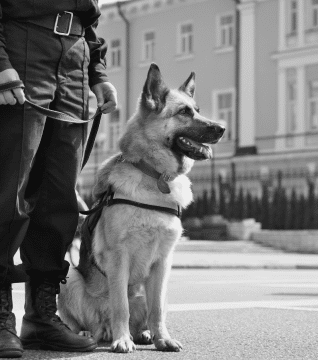Police Dog Bites
Police dogs are helpful law enforcement tools because they act in ways human officers can’t in pursuing and detaining suspects, detecting dangerous explosives and illegal substances, and aiding search and rescue efforts. However, police dog bites are a common consequence. They are subject to state and federal laws regarding police misconduct and the use of force. If you need help determining whether to pursue compensation following a police dog bite, contact the Police Brutality Center.
Were you or a loved one a victim of police brutality?
Attorneys that work with Police Brutality Center may be able to assist you.
"*" indicates required fields
Due to their agility, speed, and sense of smell, police dogs help law officers track suspects, find missing persons during rescue efforts, and pinpoint the location of illegal substances or explosives.
Police dog training techniques cause K-9s to bite hard and hold on when they detain a suspect until officers arrive. While effective, this method also can trigger severe dog bites that injure innocent bystanders or people who pose no threat to themselves or others. When these injuries happen, victims can file claims to hold the police liable.
Why Do the Police Use Dogs?
Dogs have larger olfactory receptors than humans. This difference allows them to smell up to 1,000 times better. They also can cover much more ground than their human handlers.
Because of their heightened senses and agility, police dogs perform several duties that help law enforcement. In some cases, K-9s do things their police handlers cannot do, including the following:
Detecting Explosives or Substances
With proper training, police dogs can ignore other smells and focus only on the substances they seek, including explosive materials in an airport or cocaine and other illegal substances during a traffic stop.
Search and Rescue Efforts
Humans leave strong scent trails, and dogs can differentiate a specific person’s smell from another’s. This ability makes dogs great at search and rescue efforts. For example, they can find a child in the woods by following only the scent from an article of clothing or another item carrying their scent.
Trainers also can teach dogs to differentiate human smells from other smells. These dogs can find a human trapped alive beneath a collapsed building, even without having a specific person’s scent trail to follow. Other K-9s are trained cadaver dogs.
Tracking Criminal Suspects
Police dogs can help officers track suspects thanks to their sense of smell, agility, speed, and stamina. For example, a K-9 can help an older officer track a younger suspect or continue a chase when police get bogged down by equipment.
Police dogs are often trained to bite and hold the arm or leg of suspects until police catch up. There is some controversy over this technique, especially in cases where dogs hold on longer than necessary.
Who Is Liable in a Police Dog Bite Case?
Officers can face police misconduct charges if they handle a dog that causes unnecessary harm. The standards are similar to those that apply to human officers.
The use of force must be justified according to what was objectively reasonable at the time. Successful police dog bite cases require plaintiffs to show that the police used excessive force according to state and federal law when siccing the dog on the victim.
Additionally, state laws vary regarding when an owner can be liable for a dog bite. Most states have strict liability statutes, meaning the dog’s owner is usually liable in bite cases. However, some states specifically exempt police dogs in their dog bite laws.
The judge or jury will consider several questions related to these laws, including:
- Was the dog performing official duties when the bite occurred?
- Was the suspect still fleeing, or did the police have them under control?
- Was the suspect a danger to others?
- Did the police warn the suspect before releasing the dog?
- How long did the dog bite last?
- Did the police intentionally allow the dog to cause unnecessary harm?
- Were there less violent means to subdue the suspect?
- Did the suspect surrender or continue to fight the dog or the officers?
- What crime did the police think the suspect committed?
- Did the dog bite without warning or hold on after being commanded to let go?
- Did the dog bite the wrong person?
- Was the dog properly trained and certified?
- Was the dog being used for the purpose for which it was trained?
- Was the dog adequately cared for?
- Did the dog receive proper rest and play breaks between assignments?
Recent Cases of Police Dog Bites
K-9s and their police officer handlers sometimes deviate from their training. When such incidents happen, police dog bites can be considered unreasonable and constitute police misconduct.
An injured citizen should consult a civil rights attorney to determine whether the police violated their rights and whether to file a police dog bite lawsuit.
Some notable police dog bite cases include the following:

Jadarrius Rose, 2023
In Ohio, a K-9 officer was fired after releasing his dog to attack truck driver Jadarrius Rose. When police pulled him over, Rose had his hands in the air and posed no threat. The incident was caught on police body and patrol car cameras. There is audio of a state trooper telling the officer not to release the dog. The victim suffered a severe bite to his arm and filed a civil suit with the help of a prominent civil rights attorney.

Jason Shelton, 2021
A K-9 officer in Colorado released his dog to attack Jason Shelton, who had simply stopped to fix his bicycle near the scene of a recent crime. The other officer told the K-9 officer that he had the wrong suspect, but the K-9 officer released the dog without warning.
Shelton had several arm bites, and a vehicle ran over his legs after the dog knocked him into the street. Colorado Springs paid $175,000 to settle a federal lawsuit.

Kevin and Mary O'Neill, 2020
A K-9 officer’s dog ran across his yard and attacked his neighbor. The victim, Kevin O’Neill, suffered several injuries, and he and his wife, Mary, experienced post-traumatic stress disorder. The city of Hendersonville settled the case for $1.75 million. It also ordered an investigation led by canine experts into why the dog attacked and how to prevent similar attacks from happening again.

Jamie Lopez, Arnold Daniels, Willie McKenzie, and Hilbert Gresham, 2008
The city of Irvington, N.J., paid $115,000 to settle cases involving four men bitten by the same police dog. Every case involved minor crimes, and the same officer arrested each suspect. The plaintiffs’ attorney noted that while police dogs have legitimate uses, K-9 officers should not let the dogs do their work for them.
How Are Police Dog Bites Dangerous?
A police dog bite can cause severe injuries because the bite-and-hold techniques that dogs are taught result in significant applied force and deep wounds. Police dogs often bite multiple times, and because of their size and training, injuries are more severe than domestic dog bites.
Two breeds commonly chosen for police work are German shepherds and Belgian malinois. Training enhances the dogs’ innate tendencies toward aggressiveness and protection.
These traits also mean the dogs have relatively low inhibitions to attack. Police dogs sometimes make behavioral mistakes, including not letting go when ordered or attacking a perceived but innocent threat.

How To Hold Police Dogs Accountable for Bites
Handlers of K-9 police dogs do not always have immunity from lawsuits for bite incidents. An officer is usually not immune when they and their dog are not acting in an official capacity. There is also no protection if the order to attack is unlawful.
Police departments and municipalities are sometimes held liable for police dog bites if the dogs are not adequately trained or the department doesn’t have clear guidelines on their use. You may also have a case if you were an innocent bystander, but only if the police officer’s mistake in releasing the dog was unreasonable.
Citizens have the right to file police dog bite lawsuits for excessive force. Federal law protects citizens against excessive force and other constitutional violations under 42 U.S.C. § 1983, a federal law authorizing lawsuits against the police for civil rights violations. States also allow lawsuits under state police misconduct laws.
Filing a Police Dog Bite Claim
You can sue a police department or government agency in charge of ensuring proper training for officers and police dogs. Start by completing a complaint form on the police department’s website.
You may file a complaint at a precinct if no form is available. If this makes you feel uncomfortable or unsafe, ask an attorney for help.
You can then file a civil lawsuit to seek damages for your police dog bite injuries. It is best to work with an experienced attorney who can help you pursue a police brutality lawsuit settlement or fight for you in court if the other party does not offer a reasonable settlement amount.
Get Legal Help
If a police dog bit you and you want to pursue compensation, contact the Police Brutality Center. We can connect you with an experienced police misconduct lawyer who can advise you on whether to proceed with a lawsuit.

